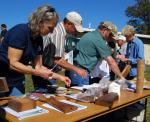COOK STATION, Mo. – Recent rains have improved several pastures around the state, but finding enough quality forage and hay will still be a challenge for many producers.
Research and extension faculty from the College of Agriculture, Food and Natural Resources at the University of Missouri will offer 10 interactive presentations at Wurdack Research Center’s annual field day, Friday, Oct. 5, to help producers improve their pastures, stretch hay supplies and take advantage of technological advancements to boost profits.
Registration begins at 8 a.m. Tours start at 9 a.m. Free lunch will be provided after morning tours. During lunch, Mike Kasten, director of the University of Missouri’s Quality Beef by the Numbers program, will explain how beef cow-calf operators can improve profitability by adopting applied reproductive and genetic technologies to meet increasing domestic and global demand for high-quality beef.
Kasten is a cattle producer and has focused on improving his herd for more than 30 years. He’ll share his personal experience with AI, total performance evaluation and total carcass evaluation.
“This technology can benefit any size producer,” Kasten said. “The beauty of the market is that producers can get paid on individual animal basis for individual market value.”
After lunch, attendees can take a silvopasture tour demonstrating integrated timber, forage and cattle production. The following presentations will be offered on the morning tours:
- Supplementation Strategies for Poor-Quality Forage
- Herd Culling Strategies
- Stretching Short Hay Supplies
- Renovating Forages: What to do after the Drought
- Tree Leaves as Forage, or Not
- Dung Beetles: Improving the Pasture
- Chainsaw Safety
- Demonstration of a Baker Sawmill
Nestled along the Meramec River in the northeast Ozarks, the Wurdack Research Center conducts demonstrations and research in integrated livestock, forages, forestry, agroforestry and wildlife management practices for the Ozark region of Missouri. It’s part of a network of research centers across Missouri, extending the College of Agriculture, Food and Natural Resources’ research to more than 14,000 acres to meet the regional research and demonstration needs of agricultural producers and natural resource managers.
For more information, contact Dusty Walter, superintendent of Wurdack Research Center, at [email protected] or 573-884-7991.
Read more http://extension.missouri.edu/news/DisplayStory.aspx?N=1537





